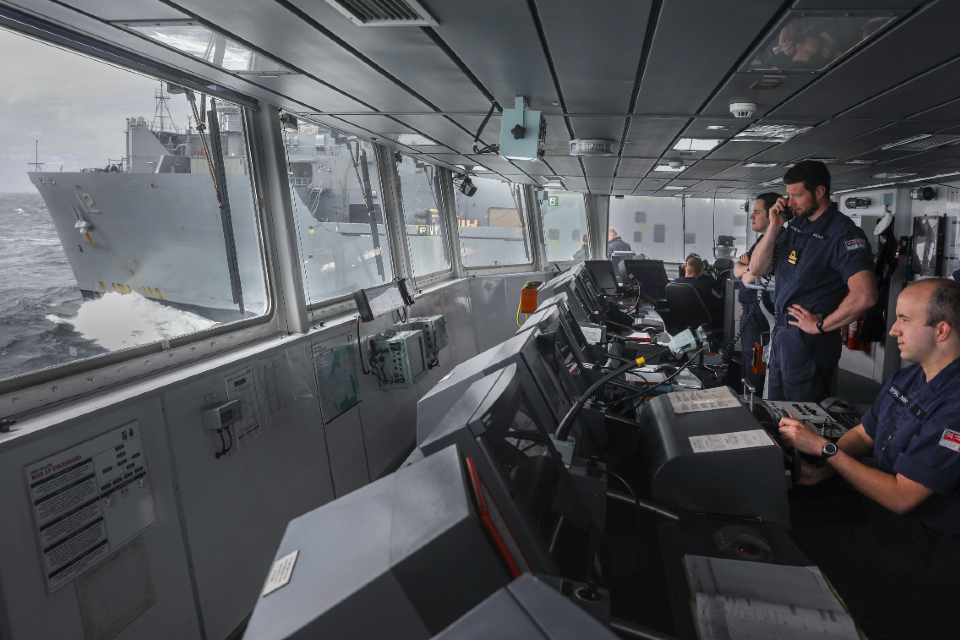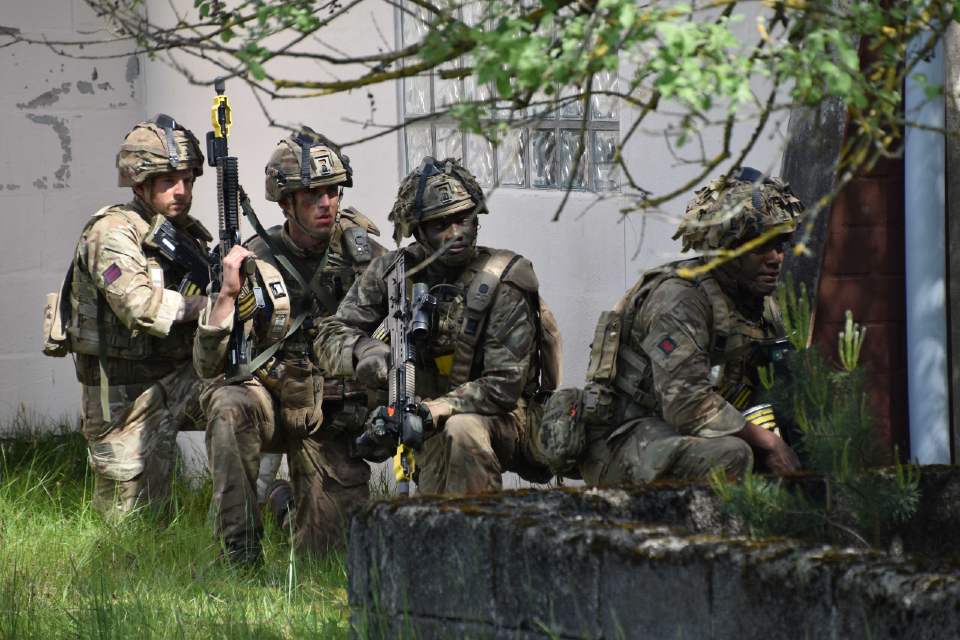AI and data science: defence science and technology capability
AI is one of the fastest-moving areas of technological advancement in government defence, bringing the capability to counter threats and create opportunities.
The Defence Science and Technology Laboratory (Dstl) provides the UK with world-class capability in applying artificial intelligence (AI), data science and machine learning to defence and security challenges. From putting machine learning on-board Royal Navy ships, to using data science to support intelligence analysis, Dstl is at the heart of such innovation.
One of Dstl’s missions is to de-mystify the area of AI. We help the UK Ministry of Defence (MOD) understand how it can safely, responsibly and ethically use AI to deter and de-escalate conflict, save lives and reduce harm.
Our technical experts have their finger on the pulse of new developments in AI and provide critical guidance for the UK. We work in partnership with specialists from academia, industry and allied nations to understand and develop a broad spectrum of techniques for performing tasks and discovering insights from data using automatic processes,
We are also an integral part of the Defence AI Centre (DAIC), working collaboratively to connect MOD and the wider AI community and enable teams across MOD to adopt AI in their areas.
The wide range of potential applications include streamlining back-office functions, and supporting:
- military decision making
- autonomous platforms
- computer network defence
- sensing
- defence logistics
- policing and security
AI is critical to the UK’s future as a science and technology superpower, and when it comes to AI, MOD’s vision is to be “the world’s most effective, efficient, trusted and influential defence organisation for our size.”
…A radical upheaval in defence is underway and AI-related strategic competition is intensifying. Our response must be rapid, ambitious, and comprehensive.”(Defence Artificial Intelligence Strategy (2022)
Working with international partners
Our cutting edge work covers everything from very early research looking at how machines interact with humans, to applying data science to real-world challenges and operational requirements. Our experts collaborate with international partners to help the UK and our allies advance more quickly.
AUKUS
The 3 nations of AUKUS (Australia – United Kingdom – United States) recently tested AI-enabled uncrewed aerial vehicles that allow a human operator to locate, disable and destroy targets on the ground.
AUKUS: Autonomy and AI collaboration
Exercise Formidable Shield
Royal Navy crews taking part in a 2021 NATO exercise in UK waters were able to take advantage of AI on-board ship for the first time, when Dstl and our industry partners brought the latest technology into the command spaces of a Type 45 destroyer and a Type 23 frigate.
Tested against a supersonic missile threat, our AI-based applications were designed to help detect threats earlier and provide a rapid hazard assessment to recommend options the crew can take to counter the threat. This exciting real-world test was the culmination of almost 10 years of research and collaboration with industry suppliers.

Image taken from HMS Dragon, participating in Exercise Formidable Shield 2021. UK MOD © Crown copyright 2021
Exploiting AI in the field
We work alongside the armed forces to develop and test new technologies in the field to get our research out of the lab and in to operational use as quickly as possible.
AI toolbox
Dstl and the US Air Force Research Laboratory carried out the first deployment of a jointly developed artificial intelligence toolbox in 2 military exercises. The goal was to address the challenge of how to make AI agile, adaptable, trustworthy and accessible to the warfighter under different US and UK military use cases.
The trials showed how the toolbox would be deployed onto UK-US uncrewed ground and aerial vehicles. Members of both UK and US armed forces tested that the AI was robust and that the intended users understood any limitations of the AI.

Exercise Spring Storm
During Exercise Spring Storm, soldiers from the 20th Armoured Infantry Brigade used an AI engine developed by Dstl and the Army in collaboration with industry.
This prototype was specifically designed for the way the Army is trained to operate. During the exercise, Dstl staff analysed how the AI engine was used in practice, to understand the critical human factors including how we build trust in the AI.
The AI engine uses automation and smart analytics along with supervised learning algorithms to save time and effort and help military personnel operate much more effectively. By instantly exploiting information on the surrounding environment and terrain, the AI makes it much quicker to plan and analyse different courses of action. This is one of the first steps towards achieving machine-speed command and control.

Royal Tank Regiment prepares for operation CABRIT
Intelligence, surveillance and reconnaissance in an age of AI and autonomy
Dstl is also working with partners on how AI and autonomy pose opportunities and threats to traditional intelligence, surveillance and reconnaissance (ISR). Our research ranges from AI-enabled ISR tasking and collection, to investigating the advantage that could be brought by quantum information processing. This work isn’t just done by our AI specialists but is a great example of how we work across Dstl’s areas of expertise, such as sensing and robotics and autonomy.
SAPIENT autonomous sensor system
We have developed a standard approach for AI and autonomy in networked multi-sensor systems in security and defence which has been evaluated during multinational NATO trials, adopted by MOD and industry, and published as British Standards Institute (BSI) Flex 335.
Sensing for Asset Protection with Integrated Electronic Networked Technology (SAPIENT) specifies standards and protocols to allow AI algorithms to work together across a suite of sensors and share data with a mix of technologies.
As well as improving efficiency, SAPIENT can help deliver enhanced situational awareness to support control and command of operations, and gives MOD and our allies access to advanced AI solutions being developed by our innovative supplier base.
Advancing AI and autonomy collaboration
During a recent AUKUS trial in Australia, Dstl and the UK armed forces collaborated with Australia and the US in the Trusted Operation of Robotic Vehicles in Contested Environments (TORVICE) trial.
A number of missions were conducted, such as route reconnaissance while subject to a range of effects, and these aimed to understand and improve the resilience of AUKUS AI and autonomy systems when subjected to attack. Understanding and mitigating the impact of threats is a key step towards deploying effective and reliable AI and autonomy systems on future operations.
NQTP
We also work in partnership with the National Quantum Technology Programme (NQTP), which provides unique insights into quantum information processing, complementing our own research and building expertise to support defence.
The NQTP’s work includes funding research into quantum machine learning models, hybrid (traditional/quantum) generative modelling to improve satellite imaging, as well as quantum fingerprinting to protect such models from cyber attacks.
Working with the brightest minds
Dstl is an outstanding centre for research and we have extensive collaboration underway with leading AI organisations. Whenever possible, Dstl works with external suppliers in academia and industry to meet the needs of the UK’s defence and security.
Google Cloud and Microsoft
We are working together with Google Cloud to accelerate the adoption of AI in the UK defence sector and with Microsoft to deliver safe and responsible use of AI.

The Alan Turing Institute
Dstl is a strategic partner in the defence and security research programme run by The Alan Turing Institute who conduct world leading research in a large number of areas related to our needs.
As another example of our partnership with the Turing, Dstl and the Defence and Security Accelerator (DASA) supported a study identifying hazardous chemical and biological contamination on surfaces. Working with industry and academic partners, we explored how machine learning and data science could be used to detect substances like anthrax and nerve agents, alongside the development of innovative sensor technologies. This could be safer and more efficient than current methods.
Universities and other academic institutions
We frequently collaborate with universities and other academic institutions, often accelerating the research they have been doing and applying it to solve problems for UK defence and security - it’s a fantastic opportunity for organisations to get to work on leading edge projects with real impact on the defence and security of the country.
In 2022, we formed the Defence Data Research Centre (DDRC) - a dedicated centre of excellence focusing on problems related to the use of data for AI applications with a defence context.
We are working closely with staff at the universities of Southampton and Edinburgh, where 2 new centres for doctoral training have been funded by MOD to enable novel research in critical technology areas, such as AI and autonomy.
We have close links with other research bodies, including:
Linking up the future of the UK’s defence and security
AI and data science underpin and enable all the UK’s defence and security science and technology capabilities. They have the potential to change everything. Dstl plays a pivotal role bringing together our scientific and technical expertise across MOD.
“Future conflicts may be won or lost on the speed and efficacy of the AI solutions employed.” (Defence in a competitive age)
Our flagship AI science and technology programme delivers core defence-specific research, but also works across our capabilities to build up strong communities of practice to share and expand our expertise.
Driving AI closer to capability
DAIC
We worked with Defence Digital and MOD to establish the Defence AI Centre (DAIC) to boost research and accelerate the adoption of AI technology (announced in the Integrated Review).
The DAIC works collaboratively across defence, united and supported by a core team made up of Defence Digital (as part of Strategic Command), Defence Equipment and Support (Future Capability Group) and Dstl. The team champion, enable and innovate AI across UK defence, working with government, industry, academia and our allies for the strategic advantage of our armed forces. This includes working with DASA to help connect with innovators both in the UK and abroad.
Newcastle AI and data science hub
In 2022, we opened a brand new AI and data science unit based at the National Innovation Centre for Data in Newcastle, opening up new local opportunities for individuals and institutions to work with us.
Source of expertise and guidance
As part of our work in government, we support learning and up-skilling of people working across the defence and security sector. We also want to make it easier for more people to work with us. Our approach to this is broad, from enabling government customers commissioning our services to attracting talent from outside the defence industry to work with us.
We run regular events (such as AI Fest) to bring together the AI community across government, industry, academia and international partners. At these events, world-leading experts share their experiences including the challenges of military adoption of AI. We also discuss how to build an effective AI capability.
Biscuit books

Our series of Biscuit Books provide simple introductions to some of the complex concepts related to AI, data science and machine learning. Topics covered include human-centred ways of working with AI in intelligence analysis and assurance of AI and autonomous systems.

Ethics and safety
We are responsible and ethical in our use of AI and we are leading the way in helping others (across defence, wider government and internationally) with safe adoption.
We helped form MOD’s internal guidance on best practice for ethics in developing or using systems which use AI, to achieve the Ambitious, safe, responsible policy statement. This statement sets out the 5 ethical principles we follow:
- human-centricity
- responsibility
- understanding
- bias and harm mitigation
- reliability
Through our strong links with academia we are contributing to research into the ethical use of AI in defence .
Dstl’s experts have also collaborated with the Institution of Engineering and Technology to help raise awareness of the effective use of AI in safety-related functions, highlighting the importance of underpinning regulation and good practice to embed AI safety.
Capability areas
Our staff, industry and academic partners work across a range of scientific and technology capabilities including:
- AI vulnerabilities
- AI and data science regulation and ethics
- AI and machine learning algorithms
- applied AI and data science
- cloud, edge AI and future AI infrastructure
- data analytics and visualisation
- data engineering
- human machine teaming
- test, evaluation, verification and validation
Work with us
Job opportunities
We are always looking for talented individuals to join us.
You will work on real-world problems, with the chance to see your science and technology expertise put into practice, including hugely exciting opportunities for overseas travel and working with the UK’s allies.
Experience in defence is not necessary, and roles vary from apprenticeships to visiting fellowships (for example, we have a Visiting research scheme with the Alan Turing Institute). While we have a high intake of graduates, you can also be mid-career, looking to re-skill and re-train.
- Meet Sharaz, one of our graduates working in Cyber and Information Systems (CIS)
- Find out more about the benefits of working for Dstl and our current vacancies
Opportunities for suppliers
We work across Defence to partner with academic institutions and build relationships with suppliers. We particularly welcome companies and research bodies who have not worked with defence before, and small and medium-sized enterprises (SMEs).
There are several routes to working with us:
- sign up to R-Cloud, which matches suppliers and capabilities to our requirements
- join our supply chain through our procurement frameworks; the key Dstl procurement frameworks for AI are Serapis and Astrid
- find requirements listed on the Crown Commercial Services frameworks for Digital Outcomes and Specialists and AI
- see funding opportunities promoted through DASA
Contact us
Talk to us about potential future partnerships and projects by emailing centralenquiries@dstl.gov.uk
Updates to this page
-
Added video about 'Driving AI closer to capability'.
-
New video of the 3 nations of AUKUS have trialled a futuristic integration of autonomy and AI.
-
Updated with links to the latest case studies and information about Dstl's work on AI.
-
First published.